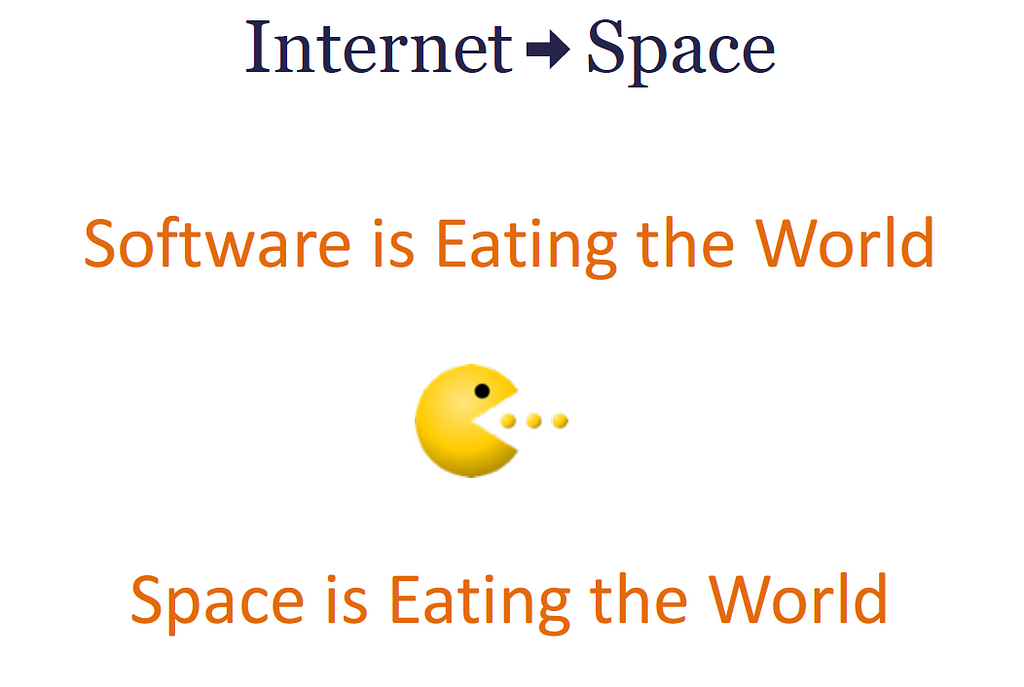Bringing Space Back to Earth

While it’s inspiring to think about becoming an interplanetary species, there’s plenty of opportunity in bringing space back to Earth.
Why bring space to Earth?
The dream of space has always been about leaving Earth. So it seems counterintuitive to focus on the opposite. It’s almost too practical.
And yet it’s already happening. Private sector innovation is leading to improvements in both launchers and satellites which monitor our planet from space — creating exponential growth in data back on Earth. Cost, variety, and most importantly, speed of iteration, have been transformed.
As an example, our portfolio company Spire went from no satellites in 2012 when we first invested to 40 by 2017, with applications in areas including shipping and weather.
The infrastructure is now at critical mass to start opening up to partners for building external applications. Instead of building and launching your own network of satellites, you can get access to the data directly.
There are also many under appreciated applications on Earth which will be critical to successfully becoming an interplanetary species. Take digital healthcare as an example: portable diagnostic devices, telemedicine, and augmented reality are just three of the obvious areas of overlap.
Can space eat the world?
The space ecosystem up until recently has been primarily focused on space infrastructure. The massive opportunity going forward is to connect this amazing group of innovators to other sectors of the economy and society.
20 years ago, the Internet was viewed as a separate industry by most people. Very quickly in the past few years, the consensus has come around to the idea that “software is eating the world”.

The space industry has a similar potential for impact across society. But whether that potential will be realized is still unclear. Whether that impact will be positive or negative is also unclear. It’s up to all of us to figure it out — together.
Start with talent
Our team at Fresco Capital recently held an event in Singapore about expanding the ecosystem, which included a panel about talent.
One of the panel participants was Lynette Tan, Executive Director at Singapore Space and Technology Association. After this panel she wrote an overview about some of the opportunities in the sector. Here is a key takeaway related to building the talent part of the ecosystem:
“The integration of space technology into our daily lives also means new modern disciplines are now required. With the avalanche of data from and flowing through space systems, programmers, computer scientists and big data experts are all likely to find increasing demand for jobs seeking to monetise these assets.”
The talent needs described above are clearly cross-disciplinary.
But that’s not all. If we’re going to build successful applications, there will be a need for design, user experience, and sales, to name a few obvious categories that are not traditionally associated with the space industry.
That’s great news in the current environment of concerns about technology replacing humans in jobs. Space applications are a potential growth driver of new jobs across the entire economy.
Of course, there’s the challenge of aligning our education system with these job opportunities, but that’s worthy of an entirely separate discussion on its own.
Practical public / private
At the International Astronautical Congress (IAC) just held in Adelaide, there were representatives of both the public and private sector from all over the world.
On one of the industry panels, a private sector member was the living embodiment of the entitled capitalist, saying something to the effect of “the only role of government is to get out of the way.” This view has the benefit of clarity, but it has the much larger drawback of being completely impractical.
At this same conference, I had a chance to share a panel with members of both the European Space Agency (ESA) and NASA, as well as give a presentation to an audience of country representatives from all over the world. Overall, I found these public sector members to be very self-aware of their organizational constraints and refreshingly open minded about finding creative solutions.

Here’s the reality: government to government space agreements and negotiations move at a snail’s pace. The private sector can move faster in theory.
Unfortunately, there are several roadblocks. Export restrictions. Import restrictions. Talent restrictions. Mostly because space is considered to be a strategic industry, which is understandable.
This creates an opportunity for private sector companies operating in applications because the regulatory environment is completely different from the traditional space industry. Obviously, there are still regulations and restrictions when it comes to data and applications. But the level of freedom for the private sector is significantly greater when operating in this application layer as compared to space infrastructure.
It’s important to recognize that governments will continue to play a key role in developing the space industry. At the same, the private sector has a unique opportunity to innovate around applications.
Connecting space to applications
It’s no accident that some of the most exciting private sector entrepreneurs in the space sector have an Internet background. But this cross-over shouldn’t be limited to billionaires who have the capital to start investing in space infrastructure.
One of the lessons from the development of the Internet is that eventually infrastructure and applications do get connected.
Sometimes this is through open standards and co-operation. HTTP is everywhere and yet invisible to almost every user.
Conversely, even a single company can dominate a key connection layer with regulators struggling to catch up.
We could all sit back passively and hope that things “just work” in the evolution of connecting space to applications. That when a billionaire decides to set up either a for profit or even a non-profit, they will be mindful of other stakeholders.
Alternatively, we could be proactive and intentional in building these connections with a mix of co-operation and competition. And in the process, just like the Internet, we may discover that the number of applications related to space are infinitely larger than we ever imagined, right here on Earth.
Bringing Space Back to Earth was originally published in Fusion by Fresco Capital on Medium, where people are continuing the conversation by highlighting and responding to this story.